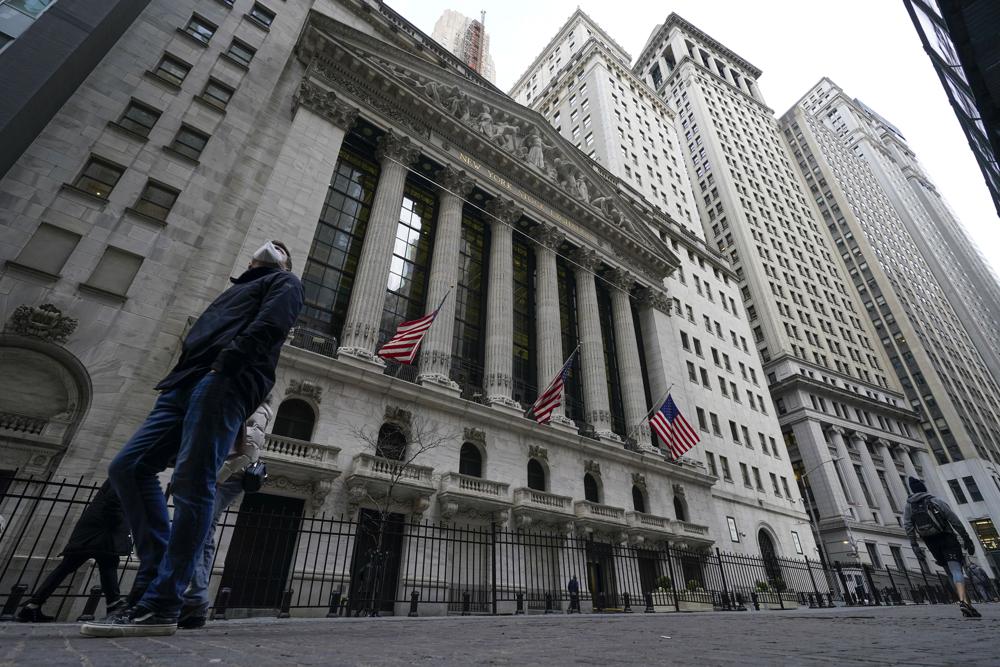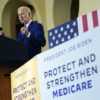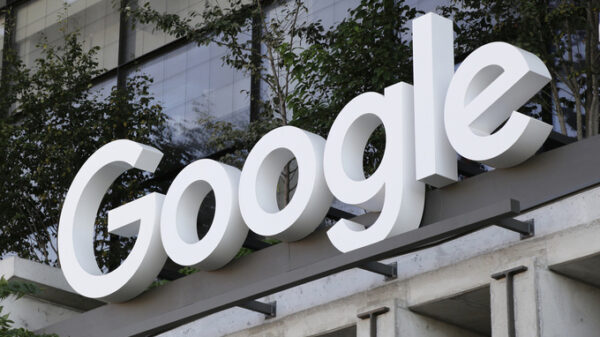The New York Stock Exchange is seen in New York, Thursday, Feb. 24, 2022. Markets are opening mostly higher on Wall Street Friday after a wild ride a day earlier. The S&P 500 added 0.4% in the early going, following even bigger gains in Europe. (AP Photo/Seth Wenig)
NEW YORK (AP) — U.S. markets pointed toward a lower open Monday and the ruble plunged to a record low of less than one U.S. penny after Western nations moved to block some Russian banks from a global payments system.
The U.S. Treasury Department also announced new and powerful sanctions that could immobilize any assets of the Russian central bank in the United States or held by Americans. The Biden administration said Germany, France, the UK, Italy, Japan, European Union and others will join the U.S. in hitting Russia’s central bank, which announced Monday that the Moscow stock exchange would remain closed Monday.
On Wall Street, futures for the Dow industrials slipped 0.8% and that for the S&P 500 fell 0.9%.
Russia’s invasion of Ukraine has caused markets to swing wildly, given the vast potential economic impact, especially on inflation and energy supplies.
Putin’s order that Russian nuclear weapons stand at increased readiness to launch ratcheted up tensions with Europe and the United States and revived dormant fears from the Cold War era.
The Russian central bank raised its key rate to 20% from 9.5% in a desperate attempt to shore up the plummeting ruble and prevent a run on banks. That brought a temporary reprieve for the Russian currency, which bounced back to the level it was at last week, but only briefly.
It fell as low as 119 to the dollar and by midday in Europe was down 18% at 96.18 to the dollar.
The ruble had plunged more than 30% after the move to block Russian banks from the SWIFT payments system. Among other things, the sanctions are meant to crimp the Russian central bank’s access to over $600 billion in reserves and hinder its ability to support the ruble.
A weaker ruble is expected to cause inflation to surge, potentially angering Russians whose budgets will be stretched by soaring prices. It will also add to strains across Russia’s financial systems.
“At the moment, the ruble is in a state close to free fall,” Alex Kuptsikevich of FxPro said in a report. “At some point in the coming days, we will see the limit of the fall of the ruble, from where it will begin its slow and difficult recovery. But it is hardly possible to pinpoint.”
Germany’s DAX fell 2% and the CAC 40 in Paris lost 2.7%. Britain’s FTSE 100 shed 0.9%.
On Friday, the S&P 500 climbed 2.2%, notching its first weekly gain in three weeks. The Dow Jones Industrial Average rose 2.5% and the Nasdaq composite gained 1.6%. The Russell 2000 index rose 2.3%.
The end of the month usually brings a raft of economic data, but for now the conflict is eclipsing other issues.
“It’s all about the Russia-Ukraine situation and evolutions in that situation will drive market sentiment and direction,” Jeffrey Halley of Oanda said in a commentary.
“President Putin will now have to accept that the ‘Western’ powers are prepared to accept quite a bit of economic pain now to punish Russia,” he said.
Markets in Asia appeared to take the latest developments more calmly.
Japan’s Nikkei 225 index recovered from earlier losses, edging 0.2% higher to 26,526.82. The Hang Seng in Hong Kong lost 0.2% to 22,713.02 as authorities there announced a daily record of 34,000 new COVID-19 cases in the city of 7.5 million.
The Shanghai Composite index gained 0.3% to 3,462.31 and the Kospi in Seoul climbed 0.8% to 2,699.18, while in Sydney the S&P/ASX 200 gained 0.7% to 7,049.10.
Although Asia is unlikely to suffer direct damage from the war in Ukraine, higher energy prices are an unwelcome burden for oil-importing nations like Japan, especially while they are still struggling to recover from the pandemic.
Oil prices surged Monday, with U.S. benchmark crude up $4.02 at $95.61 per barrel in electronic trading on the New York Mercantile Exchange. It lost $1.22 to 91.59 per barrel on Friday.
Brent crude gained $4.07 to $98.19 per barrel, approaching the $100 per barrel level it breached last week.
The Ukraine conflict has heaped uncertainty atop other worries over interest rates and inflation.
The U.S. Federal Reserve has suggested it will raise short-term interest rates next month by double its usual increase, the first rate increase since 2018. Higher U.S. rates tend to put downward pressure on all kinds of investments, and can have global repercussions.
In currency trading, the U.S. dollar inched down to 115.55 Japanese yen from 115.77 yen. The euro rose to $1.1201 from $1.1157.
Copyright 2021 Associated Press. All rights reserved.





























You must be logged in to post a comment Login